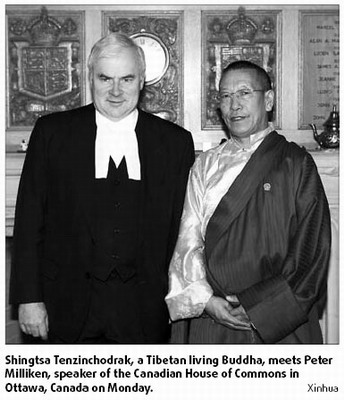
|
CHINA> News
 |
|
Canadian speaker meets NPC team
(China Daily)
Updated: 2009-03-25 13:52 OTTAWA: A Tibetan living Buddha on Monday compared the emancipation of serfs in Tibet 50 years ago to the abolition of slavery in the United States in 1862, saying the two were of similar significance. "Both are milestones in the history of human rights," Shingtsa Tenzinchodrak, a living Buddha of the Kagyu sect, said at a meeting with Peter Milliken, speaker of the Canadian House of Commons.
 The Tibetan autonomous region people's congress, the regional legislature, endorsed a bill on Jan 19, 2009 to designate March 28 as an annual Serfs' Emancipation Day, to mark the date on which about 1 million serfs in the region were freed 50 years ago. Shingtsa Tenzinchodrak, also vice chairman of the standing committee of the Tibetan autonomous region people's congress, said serfs and slaves accounted for about 95 percent of the total population in Tibet before 1959. "They possessed no means of production or personal freedom, not to mention other basic human rights," he said.
Serfs were seen as the private property of landowners, mostly noblemen, religious leaders and government officials, according to historical records. Landowners could legally insult, punish, buy and sell, whip and even brutally kill their serfs. On March 28, 1959, the Chinese central government announced it would dissolve the aristocratic local government of Tibet and replace it with a preparatory committee for establishing the Tibet Autonomous Region, to end serfdom and abolish theocratic rule led by the Dalai Lama. The move came after the central government foiled an armed rebellion staged by the Dalai Lama and his supporters, mostly slave owners who wanted serfdom to continue. "By marking Serfs' Emancipation Day, we hope that history will not be forgotten," Shingtsa Tenzinchodrak said. Milliken said the Canadian House of Commons hoped to improve exchanges with the Chinese parliament and help improve bilateral relations. Canada and China shared broad interests and the current global economic recession made cooperation and exchanges between the two countries even more important, he added. Shingtsa Tenzinchodrak is leading a five-member delegation of Tibetan deputies of the National People's Congress, China's parliament, in Canada. On Monday the delegation also met Ken Sunquist, assistant deputy minister of foreign affairs and international trade, Canada and had talks with Canadian House of Commons and Senate members. Xinhua |